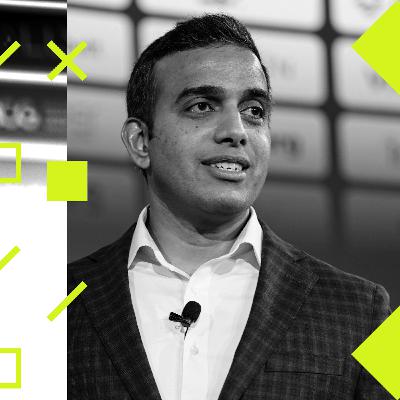Discover Decoder with Nilay Patel
Decoder with Nilay Patel

Decoder with Nilay Patel
Author: The Verge
Subscribed: 51,127Played: 1,070,639Subscribe
Share
© 2020 Vox Media, Inc. All Rights Reserved
Description
Decoder is a show from The Verge about big ideas — and other problems. Verge editor-in-chief Nilay Patel talks to a diverse cast of innovators and policymakers at the frontiers of business and technology to reveal how they’re navigating an ever-changing landscape, what keeps them up at night, and what it all means for our shared future.
907 Episodes
Reverse
Siemens is one of those absolutely giant, extremely important, fairly opaque companies we love to dig into on Decoder. At a very basic, reductive level, Siemens makes the hardware and software that let other companies run and automate their stuff.
We spent a lot of time talking about what happens to jobs when Siemens automates everything — and what happens to a company like Siemens when the free trade era we’re used to gets turned on its head.
Read the full interview transcript on The Verge.
Links:
Siemens Energy CEO attends Trump meeting at Davos | Reuters
PepsiCo, Siemens, Nvidia announce digital twin collaboration | PepsiCo
Siemens spins off Healthineers majority stake | Reuters
Siemens USA to train 200,000 electricians by 2030 | Siemens
Subscribe to The Verge to access the ad-free version of Decoder!
Credits:
Decoder is a production of The Verge and part of the Vox Media Podcast Network.
Decoder is produced by Kate Cox and Nick Statt and edited by Ursa Wright. Our editorial director is Kevin McShane.
The Decoder music is by Breakmaster Cylinder.
Learn more about your ad choices. Visit podcastchoices.com/adchoices
Today, we’re going to talk about reality, and whether we can label photos and videos to protect our shared understanding of the world around us. To do this, I sat down with Verge reporter Jess Weatherbed, who covers creative tools for us — a space that’s been totally upended by generative AI.
We’ve been talking about how the photos and videos taken by our phones are getting more and more processed for years on The Verge. Here in 2026, we’re in the middle of a full-on reality crisis, as fake and manipulated ultra-believable images and videos flood onto social platforms at scale. So Jess and I discussed the limitations of AI labeling standards like C2PA, and why social media execs like Instagram boss Adam Mosseri are now sounding the alarm.
Read the full transcript on The Verge.
Links:
This system can sort real pictures from AI fakes — why aren’t we using it? | The Verge
You can’t trust your eyes to tell you what’s real, says Instagram | The Verge
Instagram’s boss is missing the point about AI on the platform | The Verge
Sora is showing us how broken deepfake detection is | The Verge
Reality still matters | The Verge
No one’s ready for this | The Verge
What is a photo, @WhiteHouse edition | The Verge
Google Gemini is getting better at identifying AI fakes | The Verge
Let’s compare Apple, Google & Samsung’s definitions of 'photo’ | The Verge
The Pixel 8 and the what-is-a-photo apocalypse | The Verge
Subscribe to The Verge to access the ad-free version of Decoder!
Credits:
Decoder is a production of The Verge and part of the Vox Media Podcast Network.
Decoder is produced by Kate Cox and Nick Statt and edited by Ursa Wright. Our editorial director is Kevin McShane.
The Decoder music is by Breakmaster Cylinder.
Learn more about your ad choices. Visit podcastchoices.com/adchoices
Today, I’m talking with Allan Thygesen, who is the CEO of Docusign. You know Docusign, it’s the platform that lets you sign stuff online. It turns out 7,000 people work there, which is one of those facts floating around that’s always felt like perfect Decoder bait. What are all those people doing? And what kind of product roadmap does a company like Docusign even need?
Alan has only been CEO of Docusign for three years, so he has some interesting perspective on where the company was, the changes he wanted to make, and where he thinks this is all going. Hint: it involves AI.
Read the full transcript on The Verge.
Links:
Docusign's AI will help you understand what you're signing | Fast Company
Docusign on ‘transformational journey,’ CEO Says | Bloomberg
How Docusign Is modernizing the age-old business contract | Barron’s
Docusign unveils next-gen eSignature with AI | Docusign
Docusign brings its contract AI to ChatGPT | Docusign
Interview with Docusign CEO Allan Thygesen | Motley Fool (Podcast)
Subscribe to The Verge to access the ad-free version of Decoder!
Credits:
Decoder is a production of The Verge and part of the Vox Media Podcast Network.
Decoder is produced by Kate Cox and Nick Statt and edited by Ursa Wright. Our editorial director is Kevin McShane.
The Decoder music is by Breakmaster Cylinder.
Learn more about your ad choices. Visit podcastchoices.com/adchoices
Today, we’re talking about the bidding war over Warner Bros. Discovery, which is the biggest story in the entertainment industry right now, and for good reason. It has pretty much everything you could want in a buzzy Hollywood saga — big names, big money, and big drama.
To help me make sense of it all, I wanted to talk with Julia Alexander, a Verge alum and now media correspondent at Puck News who’s one of the best in the business at analyzing corporate strategy, Hollywood, and what’s next in entertainment. Julia really helped me break down why Netflix is the clear front runner to acquire Warner Bros., why David Ellison of Paramount Skydance is so desperate to win, and, perhaps most importantly, how the tech industry fits into this puzzle.
Links:
Netflix is buying Warner Bros. for $83 billion | The Verge
Paramount launches hostile $108 billion bid to snatch Warner | The Verge
Netflix revises Warner Bros. bid to an all-cash offer | The Verge
Why Netflix needs Warner Bros. | Puck News
The Warner Bros. bidding war Is over | Bloomberg
The Son King of Hollywood | Vulture
FCC Chair: ‘Legitimate competition concerns’ with Netflix’s Warner deal | Variety
Netflix's Ted Sarandos to testify at antitrust hearing over Warner deal | Variety
Subscribe to The Verge to access the ad-free version of Decoder!
Credits:
Decoder is a production of The Verge and part of the Vox Media Podcast Network.
Decoder is produced by Kate Cox and Nick Statt and edited by Ursa Wright. Our editorial director is Kevin McShane.
The Decoder music is by Breakmaster Cylinder.
Learn more about your ad choices. Visit podcastchoices.com/adchoices
Experian is one of those giant multinationals convoluted enough to have multiple CEOs all over the world, so first I asked Alex Lintner, Experian's CEO of technology and software solutions, to dig into the classic Decoder questions and explain how all of that even works.
He oversees big operations like security and privacy, and now, of course, AI. If you want to participate in the modern economy — rent an apartment, buy a car, get a job, etc — you’re part of Experian’s ecosystem, whether you like it or not. At its heart, Experian’s core service is data about people and the choices they make. And this extremely valuable data weirdly makes Experian a part of your life — a life that becomes much smoother if the data the company collects about you tells a good story.
Read the full interview transcript on The Verge.
Links:
Roughly half of Americans are knowledgeable about personal finance | Pew Research
How Americans view data privacy | Pew Research
Consumer voices on credit reports and scores | CFPB
Mercedes-Benz CEO Ola Källenius on Decoder | The Verge
The Palantir app ICE uses to find neighborhoods to raid | 404 Media
T-Mobile customers exposed in major Experian breach (2015) | The Verge
All the news about the Equifax breach | The Verge
Subscribe to The Verge to access the ad-free version of Decoder!
Credits:
Decoder is a production of The Verge and part of the Vox Media Podcast Network.
Decoder is produced by Kate Cox and Nick Statt and edited by Ursa Wright. Our editorial director is Kevin McShane.
The Decoder music is by Breakmaster Cylinder.
Learn more about your ad choices. Visit podcastchoices.com/adchoices
Grok, the chatbot made by Elon Musk’s xAI, is able to make all manner of AI-generated images on demand, including non-consensual intimate images of women and minors. It's the kind of "controversy" that would have completely sunk a platform five or 10 years ago, but now it seems clear that Elon wants Grok to be able to do this.
A lot of people feel like someone should be able to do something about a one-click harassment machine like this. But who has that power, and what they can do with it, is a deeply complicated question,tied up in the thorny mess of history that is content moderation and the legal precedents that underpin it. So I invited Riana Pfefferkorn, from the Stanford Institute for Human-Centered Artificial Intelligence, to come talk me through it.
Links:
Grok’s gross AI deepfakes problem | The Verge
Grok is undressing children — can the law stop it? | The Verge
Tim Cook and Sundar Pichai are cowards | The Verge
Senate passes a bill to let nonconsensual deepfake victims sue | The Verge
EU looks to ban nudification apps following Grok outrage | Politico
Grok flooded X with millions of sexualized images | The New York Times
The Supreme Court just upended internet law | The Verge
Mother of Elon Musk’s son sues xAI over sexual deepfake images | AP
Subscribe to The Verge to access the ad-free version of Decoder!
Credits:
Decoder is a production of The Verge and part of the Vox Media Podcast Network.
Decoder is produced by Kate Cox and Nick Statt and edited by Ursa Wright. Our editorial director is Kevin McShane.
The Decoder music is by Breakmaster Cylinder.
Learn more about your ad choices. Visit podcastchoices.com/adchoices
We’re back to start the year with a very special live interview with Razer CEO Min-Liang Tan, which we taped in front of a terrific audience at Brooklyn Bowl in Las Vegas during CES. At this year’s show, Razer made headlines for something it calls Project Ava, an AI companion that has a physical presence in the real world, as an anime hologram that sits in a jar on your desk. It’s powered by, you guessed it, Elon Musk’s Grok.
There are a whole lot of choices bundled up in all of that, as well as Razer’s decision to go all-in on AI at a moment when the gaming community is outright rejecting it. So Min and I really got into it. I think you’ll have a lot to think about with this one.
Links:
Razer is making an AI anime waifu hologram for your desk | The Verge
Razer thinks you’d rather have AI headphones instead of glasses | The Verge
Baldur’s Gate 3 studio says it won’t use AI for concept art or writing | The Verge
In 2025, AI became a lightning rod for gamers and devs | The Verge
Razer plans $600M push to capture 'untapped' AI gaming demand | Bloomberg
Replika CEO says it’s okay if we end up marrying AI chatbots | Decoder
Lawsuits blame ChatGPT for suicides and harmful delusions | NYT
Inside three longterm relationships with AI chatbots | NYT
Torment Nexus | Know Your Meme
The future of gaming is AI | Razer (Instagram)
Subscribe to The Verge to access the ad-free version of Decoder!
Credits:
Decoder is a production of The Verge and part of the Vox Media Podcast Network.
Decoder is produced by Kate Cox and Nick Statt and edited by Ursa Wright. Our editorial director is Kevin McShane.
The Decoder music is by Breakmaster Cylinder.
Learn more about your ad choices. Visit podcastchoices.com/adchoices
Hey everyone, it’s Nilay. We’re settling back in here after the winter break and CES, and we’ll have new episodes for you starting next Monday. In the meantime, we wanted to highlight one of our favorites from last year: an interview with journalist and author Megan Greenwell about her book Bad Company: Private Equity and the Death of the American Dream.
My conversation with Megan last year was extremely illuminating as to why private equity does what it does to industries like healthcare, media and real estate — and just how deeply it's affecting the everyday lives of Americans everywhere. It's a really great conversation that feels just as timely today as it did last summer. Enjoy.
Links:
Bad Company | HarperCollins
How private equity kills companies and communities | Decoder
Private equity bought out your doctor and bankrupted Toys ‘R’ Us | Decoder
Private equity makes its first college sports play | Axios
Private equity Is gutting America — and getting away with it | NYT
I was fired from Deadspin for refusing to ‘stick to sports’ | NYT
Will private equity be the next ‘Big Short’? | Marketplace
The profit-obsessed monster destroying American ERs | Vox
Why your vet bill is so high | The Atlantic
The investment firms leave behind a barren wasteland’ | Politico
Subscribe to The Verge to access the ad-free version of Decoder!
Credits:
Decoder is a production of The Verge and part of the Vox Media Podcast Network.
Decoder is produced by Kate Cox and Nick Statt and edited by Ursa Wright. Our editorial director is Kevin McShane.
The Decoder music is by Breakmaster Cylinder.
Learn more about your ad choices. Visit podcastchoices.com/adchoices
We’ve got something special for you today. It’s my friend Hank Green, longtime YouTuber, science educator, and viral TikTok star, interviewing Dropout CEO Sam Reich.
Hank did this episode as a guest host over the summer, and it’s a fan favorite, bringing together two internet personalities that’ve known each other for a very long time and who have a lot of inside knowledge about how the internet, Hollywood, and entertainment all intertwine.
Links:
Dropout’s Sam Reich on business, comedy, and keeping the internet weird | Decoder
How Dropout broke through in 2025 | AV Club
Dropout CEO on launching ‘Superfan’ tier, crossing 1M subscribers | Variety
How CollegeHumor reinvented itself for the new internet age | People
CollegeHumor shaped online comedy. What went wrong? [2020] | Wired
‘I believe in this enough to try to do it myself’ [2020] | Digiday
Jacob Wysocki needed a minute to process that Game Changer | Vulture
Game Changer smartly weaponizes its online following | Mashable
Vimeo CEO Philip Moyer is betting on the human touch | Decoder
Vimeo to be acquired by Bending Spoons for $1.38B | The Verge
Subscribe to The Verge to access the ad-free version of Decoder!
Credits:
Decoder is a production of The Verge and part of the Vox Media Podcast Network.
Decoder is produced by Kate Cox and Nick Statt and edited by Ursa Wright. Our editorial director is Kevin McShane.
The Decoder music is by Breakmaster Cylinder.
Learn more about your ad choices. Visit podcastchoices.com/adchoices
Hey everyone, it’s Nilay. Decoder is on our holiday break. We’ve got a lot of fun stuff coming up in the New Year, though, including a special Decoder Live at CES. Stay tuned for more details, including how to RSVP for free tickets.
In the meantime, we’ve got a great episode of the podcast Channels, featuring two of the best media reporters in the business. Host Peter Kafka sat down with Bloomberg’s Lucas Shaw to talk about the bidding war between Paramount SkyDance and Netflix over Warner Bros. Discovery. It’s the biggest story in entertainment right now, and this episode breaks down everything you need to know about the contentious acquisition.
Links:
"Neither Side Is Used to Losing”: Lucas Shaw on the battle for Warner Bros. | Channels
Five things we’re getting wrong about Warner Bros.′ Netflix deal | Bloomberg
Warner Bros.’ bidders brace for a fight that will last months | Bloomberg
WBD wants its shareholders to reject Paramount’s latest offer | The Verge
There are no good outcomes for the Warner Bros. sale | The Verge
Netflix is “100% committed” to releasing WB films in theaters | The Verge
Netflix is buying Warner Bros. for $83 billion | The Verge
Subscribe to The Verge to access the ad-free version of Decoder!
Credits:
Decoder is a production of The Verge and part of the Vox Media Podcast Network.
Decoder is produced by Kate Cox and Nick Statt and edited by Ursa Wright. Our editorial director is Kevin McShane.
The Decoder music is by Breakmaster Cylinder.
Learn more about your ad choices. Visit podcastchoices.com/adchoices
Hey everyone! Decoder senior producers Kate Cox and Nick Statt here. We’ve had a big year, including nearly 100 episodes, a new YouTube channel, an ad-free podcast feed, and a slate of great guest hosts while Nilay was on parental leave. It’s been a lot!
We’ve also had a lot of great questions and comments this year from you, our audience. So we pulled together all the feedback we’ve received on topics like CarPlay, Monday episode guest suggestions, and — of course — AI. And then we turned the tables on Nilay to ask him his thoughts on the past 12 months: What we liked, what we want to improve, and how he’s making decisions for Decoder in the new year.
Links:
Answering your biggest Decoder questions, 2024 edition | Decoder
The DoorDash Problem | Decoder
How decision making changes when AI answers are cheap and (too) easy | Decoder
Why GM will give you Gemini — but not CarPlay | Decoder
Rivian CEO: ‘We’re really convicted’ about skipping CarPlay | Decoder
How SharkNinja took over the home, with CEO Mark Barrocas | Decoder
Why Tubi CEO Anjali Sud thinks free TV can win again | Decoder
Disney accuses Google of copyright infringement following OpenAI deal | The Verge
Subscribe to The Verge to access the ad-free version of Decoder!
Credits:
Decoder is a production of The Verge and part of the Vox Media Podcast Network.
Decoder is produced by Kate Cox and Nick Statt and edited by Ursa Wright. Our editorial director is Kevin McShane.
The Decoder music is by Breakmaster Cylinder.
Learn more about your ad choices. Visit podcastchoices.com/adchoices
Stack Overflow CEO Prashanth Chandrasekar was last on the show in 2022 — just one month before ChatGPT launched and upended literally everything for Stack Overflow in a deeply existential way.
He called a company emergency, reallocated about 10 percent of the staff to figure out solutions to the ChatGPT problem, and made some pretty huge decisions about structure and organization to navigate that change — all of it pure Decoder bait.
Links:
2025 Developer Survey | Stack Overflow
The people who make your apps go to Stack Overflow for answers | Decoder
OpenAI, Stack Overflow partner to bring technical knowledge to ChatGPT | The Verge
Stack Overflow feeds programmers’ answers to AI whether they like it or not | The Verge
Stack Overflow cuts 28 percent of its staff | TechCrunch
AI-generated answers temporarily banned on Stack Overflow | The Verge
Stack Overflow’s strike is over, but problems persist | Jon Ericson
A new era of Stack Overflow | Stack Overflow
Subscribe to The Verge to access the ad-free version of Decoder!
Credits:
Decoder is a production of The Verge and part of the Vox Media Podcast Network.
Decoder is produced by Kate Cox and Nick Statt and edited by Ursa Wright. Our editorial director is Kevin McShane.
The Decoder music is by Breakmaster Cylinder.
Learn more about your ad choices. Visit podcastchoices.com/adchoices
Massachusetts Sen. Ed Markey and I agree it seems like democracy is on the line right now, especially around the First Amendment and the increasing pressure the Trump administration — especially FCC chair Brendan Carr — is putting on free speech. I also had a lot of questions for Sen. Markey about the supposed TikTok ban, which no one seems to know anything about, and all the other problems we’re facing in 2025.
Links:
Even the lawmakers behind the TikTok ban have no idea what’s going on | The Verge
Carr’s FCC is an anti-consumer, rights-trampling harassment machine | The Verge
The FCC is a weapon in Trump’s war on free speech | Decoder
Here’s the Trump EO that would ban state AI laws | The Verge
Silicon Valley is rallying behind a guy who sucks | The Verge
Silicon Valley’s man in the White House is benefiting himself and his friends | The New York Times
Subscribe to The Verge to access the ad-free version of Decoder!
Credits:
Decoder is a production of The Verge and part of the Vox Media Podcast Network.
Decoder is produced by Kate Cox and Nick Statt and edited by Ursa Wright. Our editorial director is Kevin McShane.
The Decoder music is by Breakmaster Cylinder.
Learn more about your ad choices. Visit podcastchoices.com/adchoices
Today, I’m talking with Willem Avé, who’s the head of product at Square. You know Square — it was started by billionaire Jack Dorsey of Twitter fame more than 15 years ago, and it got big on the back of that little magnetic reader that once plugged into the headphone jack of the iPhone and let small businesses accept credit cards.
Nowadays, of course, Square is more than a credit card reader, and sadly, the headphone jack is ancient history. The company itself is now part of parent organization called Block, which is made up of a very interesting mix of financial services like Afterpay, Cash App, and, yes, the streaming music service Tidal. So Willem and I really got into where Square is headed next with AI and automation, why he’s excited about crypto and Bitcoin specifically, and even what it means that the US is discontinuing the penny.
Links:
Square’s public roadmap | Square
Jack Dorsey is reorganizing the entirety of Block | Fortune
How Block turned Square into a financial services giant | Fast Company
Block to roll out bitcoin payments on Square | Square
Square buys $170 million worth of bitcoin | CNBC
Square, Jack Dorsey’s payments company, changes its name to Block | NYT
The penny dies at 232 | NYT
Subscribe to The Verge to access the ad-free version of Decoder!
Credits:
Decoder is a production of The Verge and part of the Vox Media Podcast Network.
Decoder is produced by Kate Cox and Nick Statt and edited by Ursa Wright. Our editorial director is Kevin McShane.
The Decoder music is by Breakmaster Cylinder.
Learn more about your ad choices. Visit podcastchoices.com/adchoices
Today, I’m talking with Verge senior AI reporter Hayden Field about some of the people responsible for studying AI and deciding in what ways it might… well, ruin the world. Those folks work at Anthropic as part of a group called the societal impacts team, which Hayden just spent time with for a profile she published this week on The Verge.
The team is just nine people out of more than 2,000 who work at Anthropic, and their only job, as the team members themselves say, is to investigate and publish quote "inconvenient truths” about AI. That of course brings up a whole host of problems, the most important of which is whether this team can remain independent, or even exist at all, as it publicizes findings about Anthropic's own products that might be unflattering or even politically fraught.
Links:
It’s their job to keep AI from destroying everything | The Verge
Anthropic details how it measures Claude’s wokeness | The Verge
White House orders tech companies to make AI bigoted again | The Verge
Chaos and lies: Why Sam Altman was booted from OpenAI | The Verge
How Elon Musk Is remaking Grok in his image | NYT
Anthropic tries to defuse White House backlash | Axios
New AI battle: White House vs. Anthropic | Axios
Anthropic will pursue gulf state investments after all | Wired
Subscribe to The Verge to access the ad-free version of Decoder!
Credits:
Decoder is a production of The Verge and part of the Vox Media Podcast Network.
Decoder is produced by Kate Cox and Nick Statt and edited by Ursa Wright. Our editorial director is Kevin McShane.
The Decoder music is by Breakmaster Cylinder.
Learn more about your ad choices. Visit podcastchoices.com/adchoices
IBM was instrumental to the entire 20th century of computing — but it's a lot harder for most of us to see what it's been up to during this century. That's because it's fully an enterprise company, and CEO Arvind Krishna says that business is booming.
But there’s a huge change coming to that business as well, as Watson-style deep learning has given way to LLMs and generative AI. Sure, Arvind says IBM got there a little too early. But he doesn’t seem concerned that IBM would be stuck on the sidelines.
Read the full interview transcript on The Verge.
Links:
Computer wins on ‘Jeopardy!’: Trivial, it’s not | New York Times (2011)
What Ever Happened to IBM’s Watson? | New York Times (2021)
America Forgot About IBM Watson. Is ChatGPT Next? | The Atlantic
IBM acquires Red Hat | The Verge
IBM and Groq Partner to Accelerate Enterprise AI Deployment | IBM
IBM’s Jerry Chow on the future of quantum computing | Decoder
IBM: quantum computing partnership with AMD is bearing fruit | The Verge
Subscribe to The Verge to access the ad-free version of Decoder!
Credits:
Decoder is a production of The Verge and part of the Vox Media Podcast Network.
Our producers are Kate Cox and Nick Statt. Our editor is Ursa Wright. Our editorial director is Kevin McShane.
The Decoder music is by Breakmaster Cylinder.
Learn more about your ad choices. Visit podcastchoices.com/adchoices
Hey everyone, it's Nilay. It’s been great being back in the Decoder chair this fall, and we’ve got a bunch of great episodes coming up to round out the year. But the production team is off this week for the holiday, so today, we’re going to share this episode of The Gray Area with you.
This time, host Sean Illing is talking to data scientist Hannah Ritchie — about climate science and how although the crisis is definitely real, it’s not all bad news. There are actually a lot of great indicators out there in the data that show real progress in limiting emissions and boosting clean energy. It’s a nuanced, hopeful take at a time when, admittedly, it kind of feels like all the news about everything is pretty doom and gloom.
Links:
We can have growth while fighting climate change | Vox
The Grey Area | Apple Podcasts
Clearing the Air | Hannah Ritchie
Subscribe to The Verge to access the ad-free version of Decoder!
Credits:
Decoder is a production of The Verge and part of the Vox Media Podcast Network.
Our producers are Kate Cox and Nick Statt. Our editor is Ursa Wright.
The Decoder music is by Breakmaster Cylinder.
Learn more about your ad choices. Visit podcastchoices.com/adchoices
Okay, let’s talk about AI and what I’ve been calling the “DoorDash problem.” This is about to define the next battle in AI, and it might completely transform not only how you order a sandwich, but also how the entire internet economy works in general.
If you’ve been listening to the show this past year, you’ve heard me bring up the Doordash problem nearly a dozen times. I’ve been asking CEOs and leaders in tech and AI about it any chance I can get. Now, a lawsuit between Amazon and Perplexity is bringing this exact issue to the forefront, kicking off a major AI browser fight that could define the future of agents and the web itself.
Links:
Amazon and Perplexity have kicked off the great AI web browser fight | The Verge
Amazon sues to stop Perplexity from using AI tool to buy stuff | Bloomberg
Amazon's Cease and Desist letter to Perplexity | Amazon
Bullying Is not innovation | Perplexity
Amazon gets hit by a Comet | Platformer
Humans Only! Why Amazon doesn’t want AI shoppers | NY Mag
Amazon vs Perplexity: the AI agent war has arrived | The Guardian
Amazon ad revenue soars 24 percent to $17.7 billion | THR
Subscribe to The Verge to access the ad-free version of Decoder!
Credits:
Decoder is a production of The Verge and part of the Vox Media Podcast Network.
Decoder is produced by Kate Cox and Nick Statt and edited by Ursa Wright. Our editorial director is Kevin McShane.
The Decoder music is by Breakmaster Cylinder.
Learn more about your ad choices. Visit podcastchoices.com/adchoices
Jamie Simonoff, founder of Ring, won't let me call him the CEO. He says his title is and always has been 'chief inventor.' His mission with Ring is to make the world safer, and he has a pretty expansive view of what that means. He told The Verge last month he thought Ring could 'almost zero out crime' in some neighborhoods within a year or two.
That's a big promise — and also potentially a very troubling one, as we face the erosion of privacy and a surveillance panopticon that only ever seems to expand.
Read the full interview transcript on The Verge.
Links:
Ring CEO: Cameras can almost ‘zero out crime’ within 12 months | The Verge
Ring plans to scan everyone’s face at the door | The Washington Post
Ring’s Search Party is on by default; should you opt out? | The Verge
Ring now works with video surveillance company Flock | The Verge
US spy agencies getting a one-stop shop to buy personal data | The Intercept
Do Video Doorbells Really Prevent Crime? | Scientific American
Ding Dong: How Ring went from Shark Tank Reject to Everyone’s Front Door | Amazon
Subscribe to The Verge to access the ad-free version of Decoder!
Credits:
Decoder is a production of The Verge and part of the Vox Media Podcast Network.
Our producers are Kate Cox and Nick Statt. Our editor is Ursa Wright.
The Decoder music is by Breakmaster Cylinder.
Learn more about your ad choices. Visit podcastchoices.com/adchoices
So a lot of people think AI is a bubble. So we sent Verge senior reporter Liz Lopatto out to report on the AI bubble — whether it's real, how it might pop, and what all of this means.She’s joining the show today to talk about a particular company that sits right in the middle of all of it. That company is called CoreWeave, and Liz has spent considerable time diving into its history, its financials, and the truly fascinating story that all of that tells us about the modern AI boom.
Links:
CoreWeave CEO plays down concerns about AI-spending bubble | WSJ
Why debt funding is ratcheting up the risks of the AI boom | NYT
Inside the data centers that train AI and drain the electrical grid | The New Yorker
How a crypto miner transformed Into the multibillion-dollar backbone of AI | Wired
CoreWeave signs $14 billion AI infrastructure deal with Meta | Reuters
CoreWeave, Nvidia sign $6.3 billion cloud computing capacity order | Reuters
Nvidia turned CoreWeave into major player in AI years before saving its IPO | CNBC
CoreWeave inks $6.5 billion deal with OpenAI | CNBC
‘Project Osprey:’ How Nvidia seeded CoreWeave’s rise | The Information
For this startup, Nvidia GPUs are currency | The Verge
Subscribe to The Verge to access the ad-free version of Decoder!
Credits:
Decoder is a production of The Verge and part of the Vox Media Podcast Network.
Decoder is produced by Kate Cox and Nick Statt and edited by Ursa Wright. Our editorial director is Kevin McShane.
The Decoder music is by Breakmaster Cylinder.
Learn more about your ad choices. Visit podcastchoices.com/adchoices

























Finding a top Irish online casino is easier with our guide. Discover honest reviews and real player feedback at http://www.walkingandhikingireland.com/ where we track licensed sites, fair games, and secure payments. Explore popular casinos offering welcome bonuses, free spins, and VIP programs. Whether you prefer slots, roulette, blackjack, or live dealer tables, our ranking highlights platforms with smooth mobile play, fast withdrawals, and reliable support. Each casino is checked for licenses, game variety, and user experience to ensure safe and enjoyable gaming in Ireland.
This episode is just a rant, there are no insights. I was done after 10 min.
Hello, everyone! I've been playing for about three years, and I've spent the last two years at https://www.jumbo88.com/. I'm happy with everything at this casino. It's the best experience and excitement I've ever had. Everything on the site works smoothly, there is no cheating, and it's always nice to come back. I especially like that the site works equally well on both mobile and desktop. I really tried to switch to other sites, but I always came back. And you know, I guess that means Jumbo88 is really the best option.
Let's get to know each other a little! Write how long you've been playing, what sites you prefer, why them. I think it will be interesting to compare the experiences of different people. Someone has probably been playing for several years, and someone, like me, is just thinking about it. The forum is for communication, after all - let's share stories and experiences!
BUT I can't seamlessly send what I'm doing on my phone to my PC, and vice versa.
AI image editing automates complex tasks like object removal or style transfer without manual input, unlike Photoshop which relies heavily on user skill and precision. AI also "understands" image context, enabling smarter, more intuitive edits.
Amazon is evil. It is the duty of all Europeans to destroy it
"Microsoft Azure Surface" lol ... ok you're an expert ...
If you are a crafting lover and are a creator, the Minecraft APK is for you. You are free with unlimited resources to mine and craft your world. It has all this in the prebuild blocks. You are to arrange these blocks to give them shape and build them into structures and landforms. https://minecraftdownloadd.com/minecraft-pocket-edition/
In the official version of Car Parking Multiplayer, you have limited features and you need to pay for its premium features. Now, there are mostly people who do not have money to invest in the game. But Don’t worry!! I have brought you “Car Parking Multiplayer Mod Ppk. In this latest version, you get unlocked cars, money, and coins all the Premium features are unlocked. Simplu, download the latest version (4.8.22.3) and enjoy your favorite game. https://carparkingapp.com/
The difference between traditional editing tools and AI-powered solutions like Remini is incredible. It simplifies complex tasks like restoring old photos, making AI editing accessible even for beginners. For more details click here https://downloadreminiproapk.com
what a terrible interview
Heme is key. Don't kid yourself.
henke is either ignorant or disingenuous and his argument simply repeats that btc can't be money bc it isn't. also, what makes him say its expensive? doesn't even compare to intl wire transfers . it produces yield. double digit %, in many cases. it's not centralized- node operators vs miners vs devs vs users. i could go on... feels like this is all a prelude to his version of a "superior" shitcoin, manipulated by men and enriching himself.
fuck fb. it's a shitty dead app which all the teens are abandoning. Won't be long before it totally dies out
Great listen!! Am now following Decoder
Hillary is Clare Underwood
Universal Basic Income.
Wake up America #YangWasRight! #YangGang and #Yang2024
so why we should panic about coronavirus? ... however now I want to study medicine at Stanford.